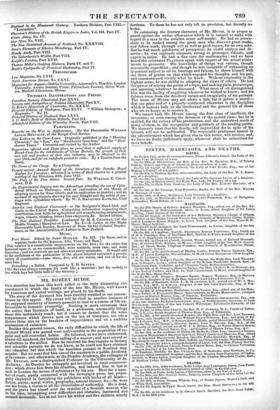MR. ROBERT MUDIE.
OUR attention has been this week called to the truly distressing cir- cumstances in which the family of the late Mr. MUDIE, well known for numerous and varied writings, are placed by his death.
The story of the deceased has been forcibly recalled to our remem- brance by this appeal His career will be cited as another instance of the supposed tendency of literary pursuits to lead to a course of life un- favourable to domestic prosperity. Nothing is more erroneous than the notion that literature of itself, as a profession, necessarily brings 'about this melancholy result; but it cannot be denied that the same temperament which throws men on the sea of literature, too often throws them also on the breakers of improvidence and on a reckless aimlessness of existence.
Besides this general reason, the early difficulties in which the life of ROBERT MUDIE was passed were unfavourable to the acquisition of re- gular and self-controlled habits. He followed, as we have understood, almost till manhood, the humble calling of a weaver; and next served as a substitute in the militia. How he received his first impulse to literary and scientific pursuits we do not know, as he could not have obtained any education but that which the humblest peasant in Scotland may acquire. But we next find him one of the teachers in a public Academy at Inverness ; and afterwards, at the Dundee Academy, the colleague of Mr. Dmicaw, now a distinguished Professor in the University of St. Andrews. At Dundee he unhappily got involved in local controver- sies; which drove him from his situation, and induced him at last to seek in London the means of subsistence by his pen. Here for a num- ber of years, partly connected with the newspaper press, but princi- pally employed in furnishing the publishers with books of all kinds— fiction, satires, moral works, geography, natural history, &c.—he wore out his brain, a victim to all the vicissitudes of authorship. He is dead, and the grave has closed over the remains of a Scottish weaver, who m his time, triumphing over difficulties and obstacles, instructed and amused thousands. Let us not leave his widow and five children utterly
destitute. To them he has not only left no provision, but literally no home.
In estimating the literary character of Mr. MUDIE, it is proper to guard against the undue allowances which it is natural to make with regard to a man in the strictest sense self-taught. He had no preten- sions to be ranked among the great men who discover great truths, and follow truth, through evil as well as good repute, for its own sake. But he bad much quickness of perception ; he could analyze and de- scribe ; he was copiously eloquent, strong in grotesque ridicule, and expert in satire. He had a fine turn for mathematics ; and we have heard the celebrated PLAYFAIR speak with respect of his actual attain- ments in geometry. His knowledge of things was various, though necessarily superficial ; and though he was incapable of exhausting an important subject in all its bearings and fulness, he threw himself with the force of genius on that which engaged his thoughts and his pen, and communicated vividly what he knew. Without originality in the highest sense, be was skilful in adapting the views of others. He had the power of seizing the points of a topic, and making plain, picturesque, and amusing, whatever be discussed. What most of all distinguished him was the facility of acquiring whatever he wished to know ; and his failures arose from the desultory nature and irregularity of his pursuits. The name of Mmnn may not adorn a tale, but it points a moral— that one great end of a properly-conducted education is the discipline which it bestows both on the intellectual and the general life of those who are so happy as to receive it We cannot rank Mr. Mtrerz among the first class of intellects, the inventors ; or even among the foremost of the second class; but he is entitled, for the variety of his productions, and the undoubted merit of many of them, to the recognition and gratitude of the reading public. We sincerely trust that his family, left unprovided for in spite of his labours, will not be unfriended. The respectable gentlemen named in the advertisement which has given rise to this notice, will receive, and, we have no doubt, judiciously apply, whatever shall be subscribed for their benefit


























 Previous page
Previous page